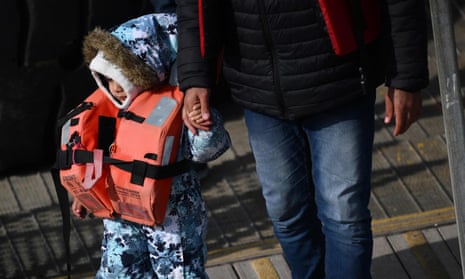Lone child asylum seekers are facing fivefold increases in delays in having their claims processed by the Home Office, with devastating consequences, according to a new report.
Social workers, legal professionals and the children themselves have warned that the impact of being left in limbo about their future for so long includes the risk of suicide, self-harm and persistent insomnia.
“Social workers and young people themselves warn us explicitly about the risk of suicide,” states the report, We Lost Our Lives When We Arrived Here, published by Greater Manchester Immigration Aid Unit, the largest not-for-profit provider of immigration advice in the north-west of England. It has a large caseload of lone child asylum seekers.
The report includes GMIAU’s own casework and Home Office data as well as interviews with child asylum seekers about their experiences.
While the overall Home Office asylum backlog is at a record level – 166,261 cases at the end of 2022 – the new report examines the impact of this backlog on one particularly vulnerable group: child asylum seekers who are in the UK without their parents.
Children represented by GMIAU who received initial asylum decisions so far in 2023 have been waiting on average for 480 days, up from an average of 89 days in 2019. The children have fled a variety of conflict zones including Sudan, Eritrea and Afghanistan.
Social workers have warned that the asylum system is neither child-focused nor trauma-informed. “As a social worker I feel that my young people need to be protected from the Home Office and the ways in which evidence or answers could be used against them,” said one social worker quoted in the report.
Due to the long delays in determining children’s cases, especially if they are age-disputed or suspected victims of trafficking, some children “age out” before the Home Office has made a decision about their case, which means they turn 18.
One of the children interviewed for the report, Amara, said: “When we wait long, without any response, we feel like we have been forgotten. That’s what I want to show, that’s the feeling that comes. Being forgotten.”
Taiwo, another child, said: “They have to look at delays for young people, because so many people kill their own selves because of the status.”
A spokesperson for GMIAU said: “There is a clear solution to the problems we’re seeing: clear the backlog by granting asylum to all the children waiting in it. Instead, the government escalate their inflammatory scapegoating and lies about people seeking safety.
“We call on the government to scrap the legislation that is burning holes in our international commitments to refugee protection and to create an asylum system that allows people to safely and swiftly access representation, justice and protection, so that all members of our communities and all children in our care are safe.”
A Home Office spokesperson said: “The overall average waiting time to process an application for unaccompanied asylum seeking children is less than stated in this report. The government is working nonstop to reduce the asylum backlog, including claims from children, by doubling the number of caseworkers.
“We take our duty of care towards children and young people extremely seriously and prioritise applications from children and young people.”
In the UK and Ireland, Samaritans can be contacted on freephone 116 123, or email jo@samaritans.org or jo@samaritans.ie.
